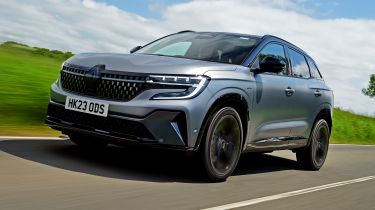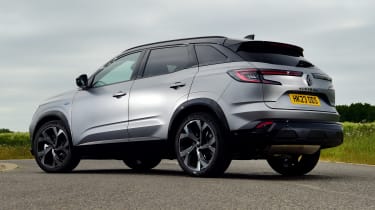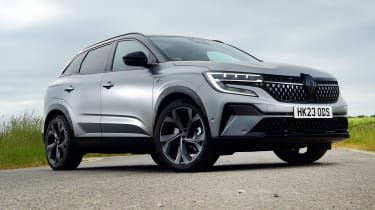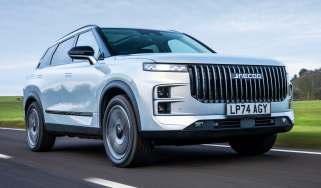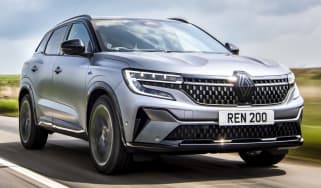Renault Austral review – a relaxing family SUV
"The Renault Austral is a comfortable, spacious and hi-tech SUV that’s a big step-up from the outgoing Kadjar"
Pros
- Full of the latest tech
- Relaxing to drive
- Practical
Cons
- Only one engine option
- Sluggish gearbox
- Other SUVs more exciting to drive
Verdict – is the Renault Austral a good car?
The Austral is a full-hybrid mid-sized SUV that sits in a hotly contested class. It’s not especially exciting to drive, but its automatic transmission and electric assistance make it relaxing to drive, particularly in town and the suburbs. Alongside a spacious interior, this means the Austral is a solid choice for buyers looking for a hi-tech and efficient family workhorse, but its lack of a plug-in version limits its appeal for company-car choosers.
Renault Austral models, specs and alternatives
It’s amazing how quickly the SUV segment is evolving; only a few years ago, Renault’s offerings were top of the class, but they are now already starting to feel dated alongside competition from Kia, Hyundai and Peugeot – such is the ferocity of the competition.
The French marque is rectifying this with a string of new electrified models which began with the fully-electric Megane E-Tech hatchback, and now this: the mid-size Renault Austral SUV. A replacement for the ageing Renault Kadjar, the Austral shares many of its parts with the Nissan Qashqai and is a rival to the Hyundai Tucson and Peugeot 3008.
Don’t be deceived by the blue ‘E’ badge on the Austral’s bootlid – this is not a fully-electric SUV. Instead, Renault is instead only offering the Austral with a self-charging hybrid powertrain in the UK. This provides improved economy over standard petrol and diesel-powered rivals, although we wish there was the option of a plug-in hybrid powertrain, as you can find in the Toyota RAV4 and upcoming Honda CR-V.
On the inside, the Austral gets Renault’s latest suite of ‘OpenR’ infotainment tech which includes an expansive portrait-style touchscreen. Overall quality is also a step up from the old Kadjar; there are plenty of solid-feeling materials and the design is much more exciting than you’ll find in a Volkswagen Tiguan.
The Renault Austral debuts an all-new trim level to tie in with the French marque’s performance brand, called ‘Esprit Alpine’. However, while the extra styling touches brought by the Esprit Alpine specification do make the Austral appear a bit more purposeful, it’s quick to assert itself as anything but sporty, no matter which trim level you opt for. The range begins with Techno, which is likely to be the sweet spot – 19-inch alloy wheels, adaptive headlights and a rear-view camera are all included. Techno Esprit Alpine sits above this, with Iconic Esprit Alpine the flagship. That car gets four-wheel steering and features like a 12-speaker stereo and panoramic sunroof. LED headlights are standard on every Austral. An animated light show greets the driver when they unlock the car.
| Trim levels | Power options |
|
|
MPG, running costs & CO2 emissions
The fact the Renault Austral is only available as a full hybrid and there are no plug-in hybrid versions might limit its appeal, especially for company-car buyers, but it’s otherwise a very frugal car with mpg in the 60s. It’s more frugal than the hybrid versions of the Nissan Qashqai and cheaper to insure, too. Read more about the Renault Austral's MPG, running costs & CO2 emissions...
Engines, drive & performance
The way the Renault Austral drives truly is one of its weaker points. It’s neither a keen driver’s car, nor does it ride the best in comparison to rivals. It can at least drive for lots of the time on electric power alone for a full hybrid which makes it good around town, but it fails to excel in any one area. Read more about the Renault Austral's engines, drive & performance...
Interior & comfort
The Renault Austral has a nice interior in terms of fit and finish and we’re big fans of its infotainment system. Even the entry-level car is packed with kit, so you only need to upgrade if you really want things like heated front seats or a fancy panoramic sunroof to make for a more upmarket experience. Read more about the Renault Austral's interior & comfort...
Boot space, practicality & dimensions
The Renault Austral is slightly larger than the best-selling Nissan Qashqai and it’s got a larger boot than that car, but look at other rivals and it’s less impressive in this area. There are lots of practical features dotted around the cabin so it’s clear Renault has put a lot of thought into the Austral’s usability, but ultimately rear legroom isn’t as generous as it could be. Read more about the Renault Austral's boot space, practicality & dimensions...
Reliability & safety
Renault has been on a downward trajectory in terms of customer satisfaction in recent years, and it’s clear lots needs to be done to rectify this. The Austral’s warranty could be better, but Euro NCAP has given it the full five stars for safety, which is encouraging. Read more about the Renault Austral's reliability & safety...
Renault Austral alternatives
The Renault Austral sits in a very busy class full of family SUV rivals. It shares many of its parts with the most popular car in this segment, the Nissan Qashqai. Many of its rivals are offered with a hybrid powertrain, while some also have plug-in hybrid versions for extra versatility, though the Austral itself is solely a self-charging hybrid.
Should you buy a Renault Austral?
The Renault Austral is definitely worth considering if you’re after a mid-size family SUV but don’t want to go for the obvious option of the Nissan Qashqai. It shares some of its parts with that car, but adds in a little bit of French flair and is a less common sight.
We really like the Austral’s OpenR Link infotainment system, which feels rather hi-tech and looks bright and crisp.
Where the Austral falls back somewhat is in its lack of a plug-in hybrid model, so you won’t be able to drive it for significant distances on electricity alone like you can with some of its rivals, and the company-car tax costs won’t be as low. As standard hybrids go, however, it’s very frugal, so many private buyers should be more than happy with it in terms of running costs.
What is the Carbuyer pick of the Renault Austral range?
Our pick of the range is the entry-level Techno trim, because it includes the fantastic infotainment system, smart 19-inch alloy wheels and everything you could conceivably need. Springing for the next trim up, Techno Esprit Alpine, is around £2,000 extra and doesn’t really make up for that in terms of kit for most buyers. It’s definitely worth checking out finance deals, though, as the difference in monthly price could be small if you do want some of those extras.
Which Is Best?
Cheapest
- NameE-Tech Full Hybrid Techno 5dr Auto
- Gearbox typeSemi-auto
- RRP£33,990
Most Economical
- NameE-Tech Full Hybrid Techno Esprit Alpine 5dr Auto
- Gearbox typeSemi-auto
- RRP£36,490
Fastest
- NameE-Tech Full Hybrid Techno 5dr Auto
- Gearbox typeSemi-auto
- RRP£33,990
